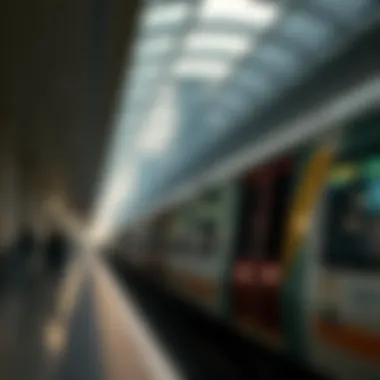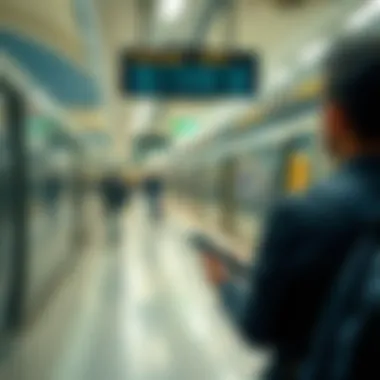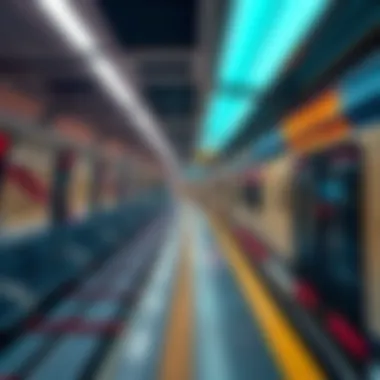Sunday Metro Timings in Dubai: What to Expect in 2023


Intro
Navigating the bustling landscape of Dubai is a distinct experience, especially when reliant on the Metro system. As the sun rises on Sundays throughout 2023, the Metro has seen various changes in its operational timings. For regularly commuting expats, locals, or tourists, understanding these adjustments is crucial.
Essentially, the Metro offers a reliable alternative to road transport, alleviating traffic congestions and air pollution. However, with unique timings on Sundays, combined with any requested adjustments or maintenance, this overview paves the way for a smoother travel experience. Familiarity with the schedules and potential disruptions can save both time and hassle.
In this article, we will unpack the Sunday Metro service for 2023, addressing key points such as the adjusted operational hours, user experiences, and how these factors affect public transport in Dubai as a whole.
By gaining insight into the shifts throughout the week, particularly on Sundays, commuters can optimize their travel plans, ensuring they arrive at their destinations efficiently. What follows aims not only to inform but to equip readers with pointed knowledge necessary for maximizing convenience in their travels.
Overview of Dubai Metro Service
The Dubai Metro is not just a mode of transportation; it's a vital artery pumping life into the urban landscape of the city. With the surge in population and the continuous influx of expatriates and tourists, understanding the operational dynamics of this system becomes increasingly important for both daily commuters and occasional riders.
Historical Context
The idea behind the Dubai Metro came to fruition in 2006, spurred on by the city's need to alleviate traffic congestion and provide a reliable mode of transport. The first line, the Red Line, opened its doors to the public in 2009, and since then, the network has expanded significantly. There was a vision to connect various parts of the city easily, and today, it encompasses 52 stations, stretching across critical zones like the Burj Khalifa and Dubai Marina. The historical significance of this development is not just in its rapid execution but in how it laid the foundation for sustainable urban transit in Dubai.
Significance in Urban Transport
In a bustling metropolis like Dubai, the Metro serves multiple purposes beyond just connecting two points. It significantly reduces journey times, offering a swift alternative to the extensive traffic often clogging the streets. The efficiency of the Metro not only enhances the daily lives of residents but also supports economic growth by facilitating easy access to businesses and commercial hubs.
Aside from reducing road traffic, the Metro is an environmentally friendly option. It plays a part in diminishing carbon emissions, aligning with the global push for sustainable transport solutions. As such, the Metro not only offers practicality but also presents a commitment to future generations in improving urban living standards. Commuters benefit from a range of services including connectivity with various other public transport systems, making their overall travel experience integrated and convenient.
The Metro is more than just trains running on tracks; it embodies a forward-thinking approach to urban mobility in Dubai, reflecting the city’s aspirations for growth while addressing critical transportation challenges.
Furthermore, understanding the operation of the Metro—especially its timings—allows commuters to plan their journeys more effectively. For instance, variations in Sunday schedules warrant specific attention to avoid unnecessary waiting periods. Recognizing these nuances is paramount for anyone relying on this transport network.
In summary, the significance of the Dubai Metro service stretches far beyond mere transport. It is an emblem of modern urban development, signifying the blend of technological innovation and sustainable practices, making it a critical component of Dubai's infrastructure.
Sunday Metro Timings in
Understanding Sunday Metro timings is pivotal for anyone navigating the vibrant urban landscape of Dubai. As the week kicks off, many are keen on utilizing the Metro service for commuting to work, running errands, or enjoying leisure activities. With Dubai's allure attracting a diverse crowd including investors, expatriates, and entrepreneurs, clarifying Metro schedules ensures seamless travel experiences and efficient time management. Knowing the precise operating hours and any special arrangements aids commuters in planning their day effectively.
Standard Operating Hours
In 2023, the standard operating hours for the Dubai Metro on Sundays have seen some noteworthy adjustments. Typically, the Metro operates from 6:00 AM to midnight during the weekdays, but on Sundays, the service kicks off a tad earlier, in a bid to accommodate varying commuter needs. Trains are set to start their operations at 6:30 AM and run until midnight, making it easier for early risers and latecomers alike to catch a ride without much hassle.
During peak hours, usually from 7:30 AM to 9:30 AM and 5:00 PM to 8:00 PM, the frequency of trains increases. Every few minutes a train whizzes by, helping to manage the influx of passengers. It’s during these hours that one may find themselves shoulder-to-shoulder with fellow commuters, relying on the Metro to avoid the notorious Dubai traffic.
Special Holiday Schedule
On occasion, special holidays in Dubai prompt alterations to the typical Metro schedule. For instance, during Islamic holidays like Eid, the Metro may extend its service hours or occasionally, operate on a modified timetable. On these special days, the operating hours could shift to 5:00 AM until 2:00 AM the following day, providing residents and visitors extended access to the transit system.
It’s crucial for passengers to keep an eye on announcements regarding these special schedules. Dubai's Roads and Transport Authority (RTA) often updates their official website with any changes ahead of holidays, ensuring commuters remain informed. Checking platforms like www.rta.ae for real-time information can save one the stress and confusion that often accompany altered schedules.
Remember: Always double-check the Metro timings on special occasions as they can differ significantly from the norm.
In summary, understanding Sunday Metro timings achieves two crucial objectives: it facilitates informed travel decisions and contributes to the smooth functioning of the bustling city. By incorporating specific adjustments for both standard operations and holidays, the Dubai Metro system remains adaptable to the ever-changing needs of its riders.


Factors Affecting Metro Timings
The Metro system is vital for many in Dubai. To grasp the workings of Sunday schedules, one must understand the influences on these timings. Several factors shape how, when, and why services run as they do.
Public Demand and Usage Patterns
Public demand plays a front-and-center role in determining metro timings. Riding the Metro isn’t just about the vehicles and tracks; it reflects the hustle and bustle of city life. On Sundays, the demand often varies compared to weekdays. While some folks might be heading back to work after the weekend, others may be looking to run errands or enjoy leisurely outings.
This ebb and flow can lead to adjustments in service frequency. During peak hours, for instance, you've got an influx of commuters who are like bees buzzing around a hive, all rushing to get to their destinations. Metro authorities keep a close eye on these patterns, using ticket sales data and feedback to project rider needs.
- The busiest hours tend to be in the morning and late evening.
- A lighter flow of riders can be observed during the midday.
Public holidays or special events can also alter these patterns. One might find that after a major celebration, people throttle back their usual routines, influencing when trains might run less frequently. Knowing the general public's schedule is key for the Metro to provide effective service.
Maintenance and Upgrades
While commuter patterns impact Metro timings, regular maintenance and upgrades are equally pivotal. Think of a car; if you want it to run smoothly, it needs periodic check-ups. The same applies to the Dubai Metro. Scheduled maintenance ensures safety and functionality. This work often leads to temporary service disruptions, which are communicated through various platforms, like the official Metro website and social media channels.
Planned upgrades are another piece of the puzzle. These could involve enhancing current systems, adding new technology, or improving train capacity. When upgrades are on the table, the Metro may adjust schedules accordingly to facilitate the work.
'Safety and reliability are non-negotiable in public transport. Routine checks help keep the Metro in top shape.'
From time to time, commuters will need to account for reduced metro frequencies or altered routes, particularly during extensive maintenance work. Understanding these elements can spare riders from unexpected delays, making their travel experience smoother.
In essence, public demand and maintenance considerations are intertwined with the operational dynamics of the Metro. A grasp of these factors empowers commuters, ensuring they can navigate their journeys on Sundays and beyond with confidence.
Comparative Analysis with Other Days
In order to grasp the full picture of how the Metro system operates, examining the differences in timings on Sundays compared to other days of the week holds significant importance. Understanding these nuances not only helps commuters plan their travel more efficiently but also sheds light on broader operational trends that might affect their daily routines.
When we speak of comparative analysis, we refer to the method of evaluating and contrasting the service on Sunday with that of Monday through Friday and its proximity to Saturday service. A comparative approach aids in recognizing patterns in ridership, operational capacity, and overall commuter satisfaction.
By dissecting the Metro’s schedule throughout the week, we can draw informed conclusions about its adaptability to varying public demands, thereby emphasizing the role public transport plays within the urban landscape.
Comparison with Weekday Timings
Unlike Sundays, which traditionally maintain a more relaxed pace, Metro services on weekdays are bustling and often operate at peak capacity. During the week, particularly from Monday to Thursday, trains run with increased frequency to accommodate the throngs of commuters traveling to work, schools, and other obligations.
On weekdays, the Dubai Metro operates from:
- 5:00 AM to 12:00 AM (midnight) from Monday to Thursday
- 5:00 AM to 1:00 AM on Fridays
These hours contrast starkly with the reduced operational window on Sundays, where the service is typically:
- 8:00 AM to 12:00 AM (midnight)
This shift not only grants riders a leeway on weekends but reflects the essence of Dubai's work culture on weekdays. The early-morning rush is met by shorter wait times and quicker train frequencies.
To encapsulate, the stark difference in timings underscores the balance between accommodating both the working populace during weekdays and the leisurely weekend travelers.


Comparison with Saturday Service
Saturday service stands as a bridge between the full weekday schedules and the more leisurely pace of Sunday operations. While Saturdays often see a mix of commuters and leisure travelers, the timetables mimic that of Sundays, but with a slight variance in morning hours.
Typically, the operational hours for Saturdays are:
- 6:00 AM to 12:00 AM (midnight)
It permits a gradual transition into the full Sunday timetable, accommodating the weekend crowd more effectively. Comparison with Saturday's service illustrates how the Metro system flexibly adjusts to meet the weekend's demands while maintaining a balance.
In essence, Sunday being the least hectic day for Metro operations highlights a critical insight into urban planning. It begs the question: How does a city prioritize public transport in tune with its varying rhythms? When you look at the numbers, Sundays might be less busy, but they are equally vital, as they offer a slower-paced experience for tourists and residents alike, which equally contributes to Dubai's vibrant transit ecosystem.
User Experience and Feedback
The significance of user experience and feedback cannot be overstated, especially when discussing a crucial service like the metro system in Dubai. The Metro is more than just a mode of transport; it serves as a lifeline for many residents and visitors alike. With the changing times, it is essential to consider not just the infrastructure and timings, but also how those changes are perceived by the everyday commuter. Having a clear understanding of user experience provides insights that can lead to improved services and better satisfaction rates.
What does user experience encompass? It goes beyond the timeliness of trains. Elements such as ticket purchasing ease, cleanliness of the stations, the helpfulness of staff, and overall safety can significantly influence riders' satisfaction. Furthermore, when feedback loops are open and actively encouraged, it empowers commuters by giving them a voice regarding essential operational changes.
Commuter Testimonials
Listening to individuals who use the metro gives valuable insights into the effectiveness of its operation. Many regular users often reflect on their metro journey through short stories, forming a tapestry of experiences that highlight the pros and cons of the service.
"I rely on the metro every Sunday to reach my workplace, and I've observed the punctuality of the trains has greatly improved this year," shared Ahmed, an expatriate engineer. "However, sometimes the rush hours still create quite the crowd, making travel a bit uncomfortable."
Another rider, Fatima, echoed similar sentiments, stating, "I appreciate how clean the trains have remained, especially since I travel with my kids. But during special events, I've noticed that the frequency of the trains doesn’t quite meet the demand."
These testimonials hint at the need for adaptive measures during peak times and an acknowledgment of the daily challenges commuters face.
Challenges Faced by Riders
Despite the advances and improvements made in the Dubai metro service, challenges remain. While most commuters appreciate the sleek design and reliability, some aspects of the experience deserve attention.
- Overcrowding: Some routes see a significant influx of passengers, especially around peak commuting hours. Riders often find themselves pressed against each other, which can be uncomfortable, and at times, a safety concern.
- Communication: Unexpected delays can throw a wrench in the plans of even the best-laid strategies. Sometimes, riders may feel left in the dark due to a lack of timely updates on delays or schedule changes.
- Accessibility: While strides have been made, there are ongoing talks about enhancing access for less-abled people. Ensuring every passenger can use the metro comfortably is crucial.
"Public transport should be for everyone, and there’s still work to be done in making it more inclusive," remarked Omar, a frequent user.
Addressing these challenges not only enhances individual rider experience but also reduces strain on the entire system, inviting more people to utilize this vital urban transport option.
Overall, while Dubai Metro is a marvel in urban transit, the challenges faced by its commuters give important lessons for continuous improvement. Emphasizing regular user feedback and adapating services could create smoother journeys for everyone.
Future Prospects for Metro Services
The significance of discussing the future prospects for metro services cannot be overstated. As urbanization accelerates, addressing public transport becomes a pivotal area of focus for cities like Dubai. Looking ahead, there’s potential for substantial improvements in efficiency, ridership, and overall user satisfaction. Understanding these future prospects allows stakeholders to make informed decisions, influencing everything from investment to development in public transport systems.
Upcoming Developments
In the coming years, there are several developments on the radar for Dubai's metro services. Here are some notable ones:
- Expansion of Metro Lines: New lines are planned to connect underserved areas, making metro travel accessible to a greater number of residents and visitors.
- Increased Frequency: With the aim of reducing wait times, there may be adjustments in service frequency during peak hours, allowing commuters to travel with greater ease and convenience.
- Smart Technologies: Implementation of advanced technologies, such as mobile ticketing and real-time updates, could enhance user experiences. This will streamline operations and provide commuters with timely information.
- Sustainability Initiatives: As part of a broader commitment to environmental responsibility, future upgrades might include energy-efficient trains and greener stations.


Such enhancements are not merely wishful thinking; they resonate with Dubai's strategic vision for cutting-edge infrastructure.
Long-Term Vision for Public Transport
Dubai’s long-term vision for public transport encompasses a robust and seamless integration of various transportation modes. This vision is not simply limited to metro expansion but addresses holistic transport solutions:
- Integration with Other Transport Modes: The future likely involves a coherent framework where metro systems connect with buses, taxis, and other modes of transportation, creating a synergistic effect that enhances mobility.
- Focus on User-Centered Design: Future designs might prioritize accessibility, catering to the needs of all users including the elderly, differently-abled, and families with children. This approach ensures a welcoming atmosphere across the network.
- Adoption of AI and Data Analytics: Leveraging technology could shape efficient scheduling and real-time adjustments based on commuter patterns. This adaptive approach stands to improve satisfaction levels over time.
Such strategic planning indicates a long-term commitment to not only maintaining but enhancing the public transport system in Dubai, perhaps even making it a benchmark for similar urban environments.
For additional insights into the evolving landscape of public transport in urban centers, consider exploring resources like Wikipedia on Urban Transport or forums such as Reddit Discussions on Public Transport.
Additional Resources for Metro Commuters
Navigating the Dubai Metro system can sometimes feel like solving a Rubik’s cube—complicated and ever-shifting. That��’s why it’s crucial to tap into additional resources designed to streamline your commuting journey. Whether you’re a local, a visitor, or someone keen on investing in Dubai real estate, these resources enhance your travel experience, keeping you well-informed and ready to roll.
There’s an array of tools available that not only provide operational information but also offer insights into the commuter community’s feedback and tips. Having these at hand enables you to plan better, avoid hassles, and make the most of your Metro rides.
Official Metro Website and App
The official website RTA Dubai and the mobile app serve as the frontline resource for anyone engaging with the Metro service. Designed to be user-friendly, the website details various aspects like the latest schedules, fare structures, and station information saving you from any last-minute surprises.
Key features include:
- Real-time Updates: Stay on top of any service changes, including delays or repairs. The announcements could save your precious time.
- Trip Planner: Input your starting point and destination, and it will provide you with the most efficient routes, including necessary transfers, if any.
- Fare Calculator: Know exactly what you’ll pay before you even step out.
Having this app installed is like carrying a virtual conductor in your pocket. It becomes especially handy during peak hours when crowds mingle, and the hustle can muddle your plans. This technology makes it less likely for you to enter the wrong train or end up at the wrong stop.
Social Media and Community Feedback
In today’s fast-paced world, social media acts like the electric current powering communication among commuters. Platforms like Facebook and Twitter (e.g., @RTA_Dubai) provide those invaluable snippets of real-time commuter experiences. You can glean information about:
- User Experiences: Read about what other commuters faced. Insights into overcrowded trains or particularly smooth services can guide future decisions.
- Community Posts: Discussions about best times to travel, hidden gems near Metro stations, or even local eateries can help you fully experience Dubai's culture.
- Feedback Mechanism: Many official accounts encourage feedback and interactions, which can be quite empowering. Suggest a route change or bring attention to an issue you faced, and you might just see it addressed.
Incorporating these additional resources not only enhances your personal commuting experience but also solidifies a sense of community among Metro users. Riding the rails can turn into a shared journey full of insights and advice that continually improves as our city grows and develops.
Knowing where to find information is half the battle won. Don't wait till you’re in a pickle; leverage these resources to guide your Metro travel.
Epilogue
Understanding the Sunday Metro timings in 2023 is not merely a matter of checking train schedules; it has far-reaching implications for commuters and the urban landscape of Dubai itself. With the demand for efficient public transport only expected to rise, grasping the nuances of these timings becomes vital for multiple stakeholders, including investors, expatriates, and local residents.
A clear understanding of Metro schedules helps commuters plan their travel better, reducing wait times and enhancing their overall experience on the transit system. By knowing the standard operating hours and any special holiday schedules, individuals can avoid unexpected delays that might throw a wrench into their plans. This knowledge also fosters an environment where users can maximize their time, thus promoting productivity.
Moreover, the role of public transport in shaping Dubai’s socio-economic fabric cannot be overstated. As a hub for many nationalities and businesses, efficient transport linkages assist in building a more integrated community where accessibility is prioritized. Ultimately, smooth Metro operations on Sundays contribute to the larger narrative of Dubai—one that embraces modernity while honoring its rich cultural history.
"Public transport isn't just about getting from A to B; it's about the connections we make along the way."
Summary of Key Points
- The Sunday Metro schedule features both standard operating hours and specific exceptions for holidays, making it essential for commuters to keep these in mind.
- Understanding factors that affect service, including public demand and maintenance, can provide insights into potential disruptions.
- User experiences indicate areas for improvement and highlight the importance of commuter feedback in enhancing service.
- Public transport in Dubai plays a crucial role in fostering a connected urban community, accommodating a diverse population.
The Role of Public Transport in Dubai
The Metro serves not just as a means of transportation but as a linchpin in the wider public transport system of Dubai. This infrastructure promotes economic efficiency by enabling ease of movement across the city. Particularly for expatriates and business owners, a robust Metro service can significantly influence decision-making on business locations or residential choices.
Additionally, public transport caters to tourists, driving foot traffic to various hot spots and historic sites around Dubai. As visitors navigate the vibrant city, they are often reliant on the Metro for quick, reliable transit options.



